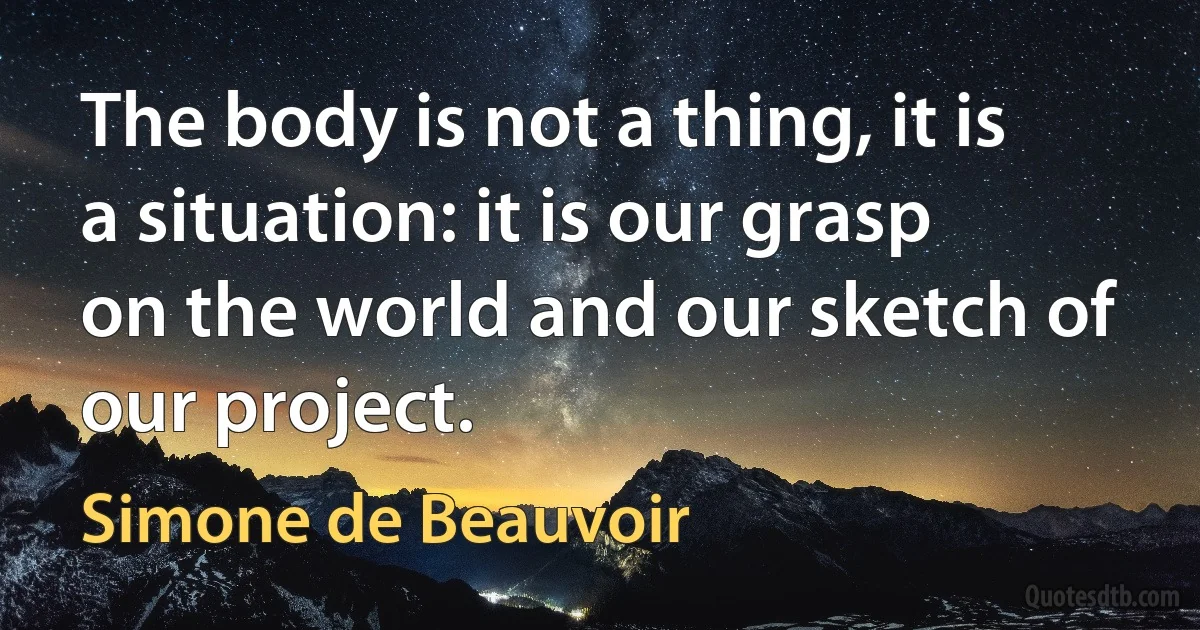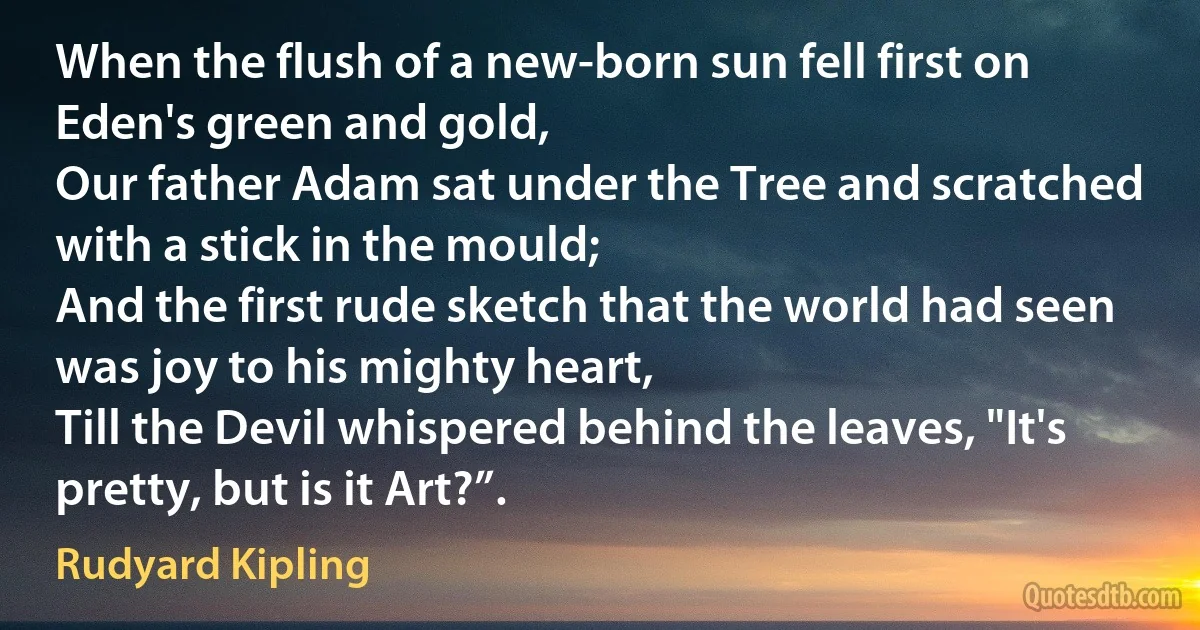Sketch Quotes - page 8
I endeavoured to sketch out (and it was, I believe, the first systematic attempt to accomplish such a task) the laws which govern the extinction of species, with a view of showing that the slow, but ceaseless variations, now in progress in physical geography, together with the migration of plants and animals into new regions, must, in the course of ages.

Charles Lyell
The crucial role of psychological and environmental factors in causing pain in a significant number of patients only recently received attention. As a consequence, there has emerged a sketch plan of pain apparatus with its receptors, conducting fibers, and its standard function which is to be applicable to all circumstances. But... in doing so, medicine has overlooked the fact that the activity of this apparatus is subject to the a constantly changing influence of the mind.

John Bonica
I take great pride in my literary works. Journalism is much faster. I'm not embarrassed by my journalism. I consider it to be like sketches, like an artist's sketch. I use it later in other writing. But I don't pretend that it has high literary merit either. I can do an essay pretty fast. I do them on airplanes, I do them at hotels, I do them at bus stops sometimes. I've written very good things on the go.

Richard Rodriguez
Under these circumstances, men lose sight of themselves and escape into the security of work or sociability or other forms of what Vidich and Bensman have called the "externalization of the self.” Vidich and Bensman sketch a troubling picture of such men: "What is left of the personality is the dulled, autonomic ritualization of behavior where ... no disturbing interferences are allowed to enter into thought. ... Personal and social life becomes barren, and the personal mechanics and daily routine of living become the end-all of existence. All types of activity whose operation is based upon an objective, external, automatic rhythm to which an individual can bend himself serve the function of enabling him to lose himself in an objective ceremony.”.

Benjamin Barber
In October 1838, that is, fifteen months after I had begun my systematic enquiry, I happened to read for amusement 'Malthus on Population,' and being well prepared to appreciate the struggle for existence which everywhere goes on from long-continued observation of the habits of animals and plants, it at once struck me that under these circumstances favourable variations would tend to be preserved, and unfavourable ones to be destroyed. The result of this would be the formation of new species. Here then I had at last got a theory by which to work; but I was so anxious to avoid prejudice, that I determined not for some time to write even the briefest sketch of it. In June 1842 I first allowed myself the satisfaction of writing a very brief abstract of my theory in pencil in 35 pages; and this was enlarged during the summer of 1844 into one of 230 pages...

Charles Darwin
An experiment was in progress to ascertain if ordinary culture had attained a stage at which it would appreciate a flood of new thought relating to a science loftier than any dealing exclusively with phenomena perceptible to the physical senses, and in connection with that experiment I was privileged to receive a considerable volume of information relating to the early history of mankind millions of years antedating the range of historical record; also to the concatenation of worlds and the ultimate destinies of our own. Though crude and incomplete, this preliminary sketch of occult science and of the agency through which, though unknown to the multitude, the purpose of creation was being worked out on the physical plane, thrilled the readers of the message all over the civilized world to an extent which gave rise to an organization, the Theosophical Society, which now covers Great Britain, Europe generally, and the United States of America with innumerable branches.

Alfred Percy Sinnett
Turner visited Plymouth (my native town) while I was staying there in the summer of 1813, or perhaps 1814 (1812 ?), painting portraits. As he wished to see the scenery of the river Tamar - [river in South-west England], I accompanied him, together with Mr. Ambrose Johns from Plymouth.. ..to a cottage near Calstock, the residence of my aunt, Miss Pearce, where we all stayed for a few days. From that point as a centre Turner made various excursions, and the result of one of his rambles was a sketch of the scene which afterwards grew into the celebrated picture of the painting 'Crossing the Brook'. The bridge in that picture is Calstock Bridge; some mining works are indicated in the middle distance. The extreme distance extends to the mouth of the Tamar, the harbour of Hamoaze, the hills of Mount Edgcumbe, and those on the opposite side of Plymouth Sound. The whole scene is extremely faithful.

J. M. W. Turner
Wallis did not become interested in mathematics till the age of thirty-one, but devoted himself to the subject for the rest of his life. One of the earliest and most important books on algebra ever written in English was his treatise published in 1685. It contains a brief historical sketch of the subject which is unfortunately not entirely accurate, but his treatment of the theory and practice of arithmetic and algebra has made the book a standard work for reference ever since.

John Wallis
To speak and to offend is with some people but one and the same thing; they are biting and bitter; their words are steeped in gall and wormwood; sneers as well as insolent and insulting words flow from their lips. It had been well for them had they been born mute or stupid; the little vivacity and intelligence they have prejudices them more than dullness does others; they are not always satisfied with giving sharp answers, they often attack arrogantly those who are present, and damage the reputation of those who are absent; they butt all round like rams - for rams, of course, must use their horns. We therefore do not expect, by our sketch of them, to change such coarse, restless, and stubborn individuals. The best thing a man can do is to take to his heels as soon as he perceives them, without even turning round to look behind him.

Jean de La Bruyère
This congeniality is another illusion. I loathe Gogol's moralistic slant, I am depressed and puzzled by his utter inability to describe young women, I deplore his obsession with religion. Verbal inventiveness is not really a bond between authors, it is merely a garland. He would have been appalled by my novels and denounced as vicious the innocent, and rather superficial, little sketch of his life that I produced twenty-five years ago. Much more successful, because based on longer and deeper research, was the life of Chernyshevski (in my novel The Gift), whose works I found risible, but whose fate moved me more strongly than did Gogol's. What Chernyshevski would have thought of it is another question-- but at least the plain truth of documents is on my side. That, and only that, is what I would ask of my biographer-- plain facts, no symbol-searching, no jumping at attractive but preposterous conclusions, no Marxist bunkum, no Freudian rot.

Vladimir Nabokov
I endeavoured to sketch out (and it was, I believe, the first systematic attempt to accomplish such a task) the laws which govern the extinction of species, with a view of showing that the slow, but ceaseless variations, now in progress in physical geography, together with the migration of plants and animals into new regions, must, in the course of ages, give rise to the occasional loss of some of them, and eventually cause an entire fauna and flora to die out; also, that we must infer, from geological data, that the places thus left vacant from time to time, are filled up without delay by new forms, adapted to new conditions, sometimes by immigration from adjoining provinces, sometimes by new creations. Among the many causes of extinction enumerated by me, were the power of hostile species, diminution of food, mutations in climate, the conversion of land into sea, and of sea into land, &c.

Charles Lyell
Even with this abbreviated sketch of the process of fertilization, one thing is obvious. When biologists object to statements about life beginning at conception, they are not splitting hairs or being pedantic. There is no time in the sequence we've just described where new life is created. In fact, from the point of view of the biologist, at conception, two previously existing living things come together to form another living thing.

Harold J. Morowitz
![[The final chapter of the book] sketch a few facts about animal brains that have inspired some of the properties of our vehicles, and their behavior will then seem less gratuitous than it may have seemed up to this poin.t. (Valentino Braitenberg)](https://cdn.quotesdtb.com/img/quotes_images_webp/99/valentino-braitenberg-animal-behavior-656899.webp)


